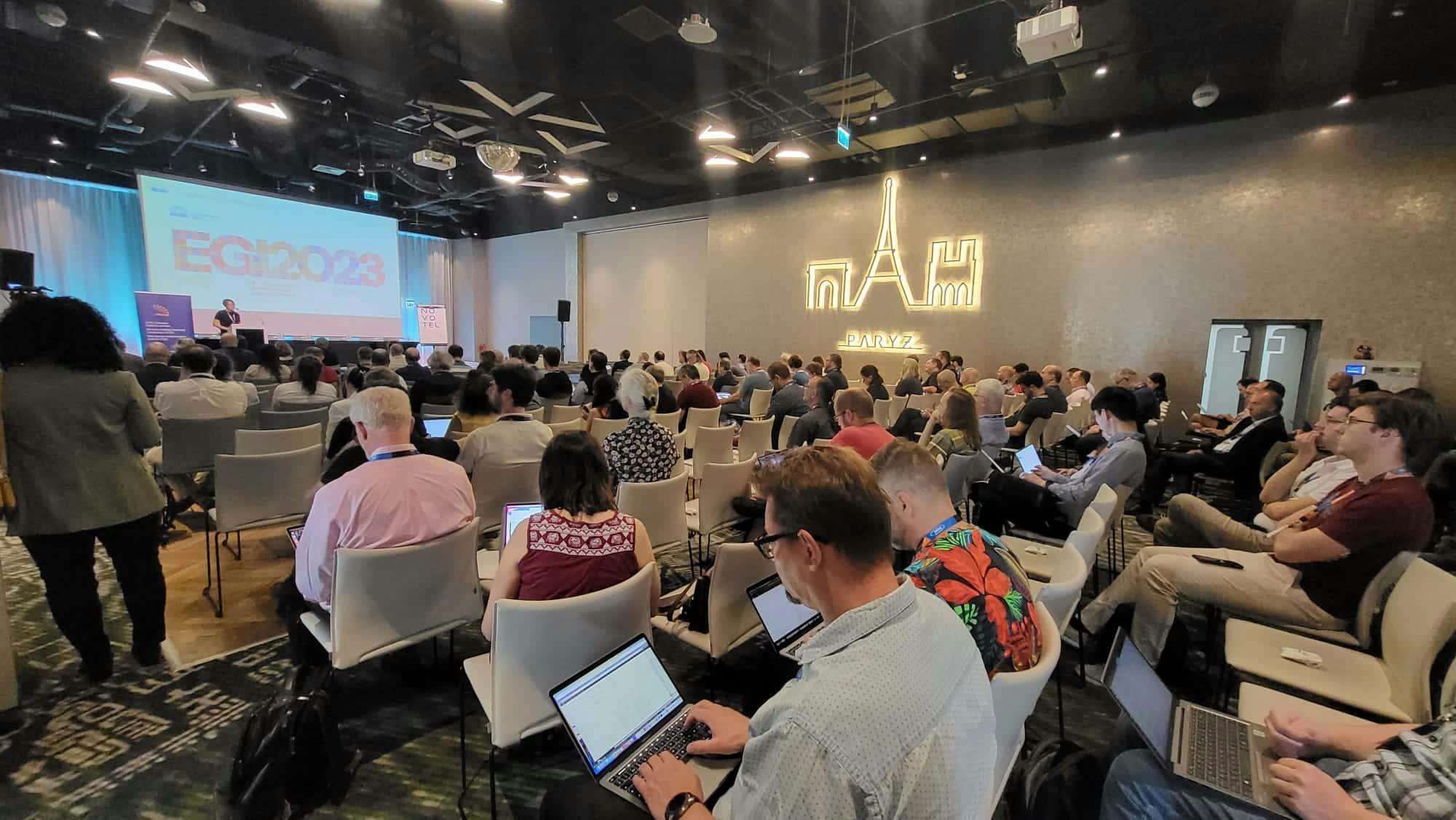Highlights from #EGI2023 – Day 1

The EGI 2023 conference commenced with an engaging first day, shedding light on the remarkable advancements over the last 20 years and future opportunities in scientific computing. This summary blog provides a concise overview of the key sessions held during the conference’s initial day, dedicated to demonstrating the results and impact of EGI-ACE, highlighting the main points discussed. With two more days of exciting sessions ahead, this overview captures the essence of the event thus far.
From Millions to Billions: 20 Years of Excellence in scientific computing in Europe
This session celebrated the 20th anniversary of the EGI Federation. From its origins as the DataGrid project to its current state, the session emphasised the growth and impact of EGI, highlighting its role in fostering research output and open-access publications.
Unleashing the Power of Computing in EOSC: Overcoming Challenges with Effective Solutions
The second session delved into the present state of computing in the European Open Science Cloud (EOSC) and the challenges it faces. Participants explored the need for collaborative, free-at-the-point-of-use services to empower researchers across disciplines. The session also highlighted the achievements of the EGI Federated Cloud and offered insights into the operational aspects of computing in EOSC. Attendees gained valuable perspectives on overcoming challenges and maximising the potential of computing within EOSC.
We did it! The innovation impact of EGI-ACE
This session provided a glimpse into the impact of the EU-funded EGI-ACE project. Real-life stories from users and service providers exemplified how scientific computing has enabled breakthroughs, facilitated collaborations, and addressed societal challenges. Demonstrations included the European big data analytics platform in geosciences, scalable online analysis and visualisation of environmental data, and reproducible open science. The session inspired attendees by showcasing the transformative potential of scientific computing.
The Way Forward: Computing in EOSC – Evolving the Role of the EGI Federation
As scientific computing continues to evolve, this session explored the integration of computing into EOSC and the evolving role of the EGI Federation. Presenters shared their vision for computing services in EOSC and discussed future perspectives for EGI-ACE services. A panel discussion featured experts from academia, research institutions, and the EOSC Association, who provided valuable insights into the future of computing in EOSC and the role of the EGI Federation. The session concluded with closing remarks, leaving attendees with key takeaways and a sense of anticipation for the upcoming days.
Following the sessions, the Exhibition opening provided an opportunity for participants to explore the latest advancements in computing for science, supporting projects and initiatives and engage with exhibitors. The event continued with one-minute pitches from poster presenters and exhibitors, allowing them to showcase their work and generate interest.
As the day transitioned into the evening, the conference opening reception took place, marking the momentous 20th anniversary of EGI. Thanks to the generous sponsorship of the EU-funded project EGI-ACE, the reception was a celebratory gathering where attendees could reflect on the achievements of the past two decades and anticipate the future. The reception featured welcoming remarks from the local organizers at PSNC and recognition of the Science Mesh project as the proud sponsor of the event.
The opening reception also included captivating demos that provided insights into various aspects of the EGI-ACE project.
Overall, the opening reception served as a moment for the community to come together, network, and form valuable connections. The collaborative atmosphere established during this event sets the stage for fruitful interactions, knowledge exchange, and the exploration of new opportunities throughout the remainder of the conference.
With two more days of enlightening sessions ahead, the conference promises to further explore the frontiers of scientific computing, ultimately shaping the future of science and technology in Europe and beyond.
